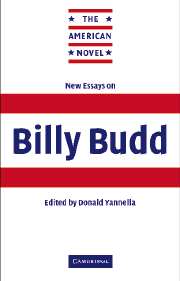Book contents
- Frontmatter
- Contents
- Series Editor's Preface
- List of illustrations
- Notes on contributors
- Introduction
- 1 Billy Budd and American labor unrest: the case for striking back
- 2 Religion, myth, and meaning in the art of Billy Budd, Sailor
- 3 Old man Melville: the rose and the cross
- 4 Melville's indirection: Billy Budd, the genetic text, and “the deadly space between”
- Select bibliography
- Index
3 - Old man Melville: the rose and the cross
Published online by Cambridge University Press: 02 December 2009
- Frontmatter
- Contents
- Series Editor's Preface
- List of illustrations
- Notes on contributors
- Introduction
- 1 Billy Budd and American labor unrest: the case for striking back
- 2 Religion, myth, and meaning in the art of Billy Budd, Sailor
- 3 Old man Melville: the rose and the cross
- 4 Melville's indirection: Billy Budd, the genetic text, and “the deadly space between”
- Select bibliography
- Index
Summary
… how live
At all, if once a fugitive
From thy own nobler part, though pain
Be portion inwrought with the grain?
– Melville, ClarelIn this chapter I would like to take for granted the rich body of commentary on the political, philosophical, mythological, and religious meanings of Billy Budd and to ask a different sort of question: what did it mean for Melville at the end of his life to spend close to six years writing and revising Billy Budd? He began the narrative early in 1886; expanded and recast it over the next two and a half years; undertook to put it in fair-copy form in November 1888 on the assumption that it was finished; then resumed work on it again, more than doubling its length and refocusing its subject, and continued to revise and polish it, sometimes with important thematic consequences, until his death in September 1891.
Though by far the most familiar of his late writings, Billy Budd was one of four substantial projects that engaged Melville after his retirement from the New York Custom House in December 1885, and, as Hershel Parker observes, it “needs to be seen in relation” to this other contemporaneous work – the verse collections John Marr and Other Sailors (1888), Timoleon (1891), and “Weeds and Wildings” (posthumous 1924) – rather than “as the single obsessive labor of Melville's last lustrum.
- Type
- Chapter
- Information
- New Essays on Billy Budd , pp. 83 - 113Publisher: Cambridge University PressPrint publication year: 2002



